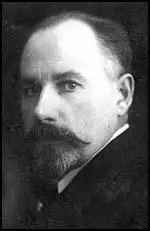Erhard Auer

Erhard Auer, the illegitimate son of a seamstress, was born in Dommelstadl on 22nd December 1874. At the age of twelve he became a farm labourer. Three years later he helped form a trade union that was immediately suppressed. In 1892 he joined the Social Democrat Party (SDP).
In 1896 he became a messenger at a trading house in Munich. Auer made rapid progress and eventually became a manager. This was followed by a managerial position in an insurance company. In 1907 Auer was elected to the Bavarian Parliament.
On the outbreak of the First World War, the SDP leader, Friedrich Ebert, ordered members in the Reichstag to support the war effort. Auer supported this policy. Karl Liebknecht was the only member of the Reichstag who voted against Germany's participation in the war. He argued: "This war, which none of the peoples involved desired, was not started for the benefit of the German or of any other people. It is an Imperialist war, a war for capitalist domination of the world markets and for the political domination of the important countries in the interest of industrial and financial capitalism. Arising out of the armament race, it is a preventative war provoked by the German and Austrian war parties in the obscurity of semi-absolutism and of secret diplomacy."
Many on the left questioned Ebert's policy when documents were published suggesting that Wilhelm II was responsible for starting the conflict. In April 1917 left-wing members of the Social Democratic Party formed the Independent Socialist Party. Members included Kurt Eisner, Karl Kautsky, Rudolf Breitscheild, Julius Leber, Ernst Thälmann and Rudolf Hilferding. Several members were arrested before being released during the General Amnesty in October, 1918.
On 28th October, 1918, Admiral Franz von Hipper and Admiral Reinhardt Scheer, planned to dispatch the fleet for a last battle against the British Navy in the English Channel. Navy soldiers based in Wilhelmshaven, refused to board their ships. The next day the rebellion spread to Kiel when sailors refused to obey orders. The sailors in the German Navy mutinied and set up councils based on the soviets in Russia. By 6th November the revolution had spread to the Western Front and all major cities and ports in Germany.
Kurt Eisner, the leader of the Independent Socialist Party in Munich, called for a general strike. As Paul Frölich has pointed out: "They (Eisner and his political supporters) were enthusiastic about the idea of the political strike especially because they regarded it as a weapon which could take the place of barricade-fighting, and it seemed a peaceable weapon into the bargain."
Chris Harman, the author of The Lost Revolution (1982), has argued: "On 7th November, 1918, the city was paralyzed by the strike. Auer (the SDP leader) turned up to address what he expected to be a peaceful demonstration, to find the most militant section of it composed of armed soldiers and sailors, gathered behind the bearded Bohemian figure of Eisner and a huge banner reading Long Live the Revolution. While the Social Democrat leaders stood aghast, wondering what to do, Eisner led his group off, drawing much of the crowd behind it, and made a tour of the barracks. Soldiers rushed to the windows at the sound of the approaching turmoil, exchanged quick words with the demonstrators, picked up their guns and flocked in behind."
Eisner led the large crowd into the local parliament building, where he made a speech where he declared Bavaria a Socialist Republic. Eisner made it clear that this revolution was different from the Bolshevik Revolution in Russia and announced that all private property would be protected by the new government. Eisner explained that his program would be based on democracy, pacifism and anti-militarism. The King of Bavaria, Ludwig III, decided to abdicate and Bavaria was declared a republic.
On 9th November, 1918, Kaiser Wilhelm II abdicated and the Chancellor, Max von Baden, handed power over to Friedrich Ebert, the leader of the German Social Democrat Party. At a public meeting, one of Ebert's most loyal supporters, Philipp Scheidemann, finished his speech with the words: "Long live the German Republic!" He was immediately attacked by Ebert, who was still a strong believer in the monarchy.
During this period Erhard Auer remained loyal to Ebert and was appointed as Minister of Interior. In 1919 he survived an assassination attempt. After his recovery he became chairman of the SPD parliamentary group. He was also active in Munich and was one of the most important figures in resisting the Nazi Party during the Munich Putsch in 1923.
In 1933 Adolf Hitler became Chancellor of Germany. Auer was arrested and was sent to Dachau Concentration Camp, where he died or was executed on 20th March 1945.
Primary Sources
(1) Chris Harman, The Lost Revolution (1982)
On 7th November, 1918, the city was paralysed by the strike. Auer (the SDP leader) turned up to address what he expected to be a peaceful demonstration, to find the most militant section of it composed of armed soldiers and sailors, gathered behind the bearded Bohemian figure of Eisner and a huge banner reading Long Live the Revolution. While the Social Democrat leaders stood aghast, wondering what to do, Eisner led his group off, drawing much of the crowd behind it, and made a tour of the barracks. Soldiers rushed to the windows at the sound of the approaching turmoil, exchanged quick words with the demonstrators, picked up their guns and flocked in behind.
